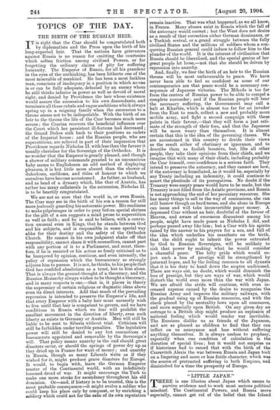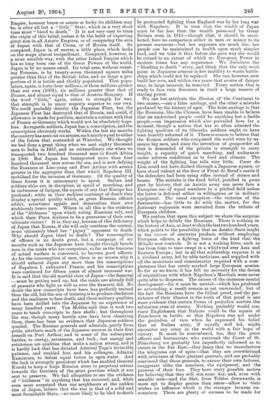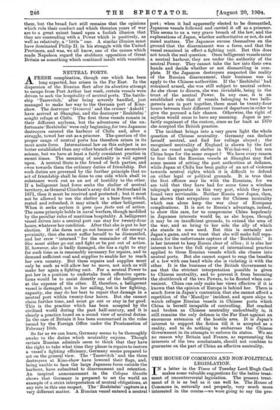Empire, however brave or astute or lucky its children may
be, is after all but a " little " State, which in a very short time must "bleed to death." It is not very easy to trace the origin of this belief, unless it be the habit of expecting great size in all Asiatic Empires, or of comparing the area of Japan with that of China, or of Russia itself. So compared, Japan is, of course, a little place, which looks on the maps almost insignificant. Compared, however, in a more sensible way, with the other Island Empire which has so long been one of the Great Powers of the world, Japan is by no means small. Its total area, without count- ing Formosa, is by twenty-seven thousand square miles greater than that of the British Isles, and as large a pro- portion of it is fertile and thickly populated. That popu- lation, again, is forty-four millions, or three millions greater than our own (1901), six millions greater than that of France, and almost equal to that of Austria-Hungary. If the word "little," again, refers to strength for war, that strength is in many respects superior to our own. We could probably destroy the Japanese Fleet, but the Japanese Fleet has destroyed that of Russia, and could, if allowance is made for position, maintain a contest with that of France or Germany which would not be absolutely hope- less. As regards soldiers, Japan has a conscription, and the conscription obviously works. Within the last six months the country has sent out six armies, each nearly equal to either of the forces that contended at Waterloo. We thought we had done a great thing when we sent eighty thousand men to India in 1857, and an extraordinary one when we transported two hundred thousand men to South Africa in 1900. But Japan has transported more than four hundred thousand men across the sea, and is now defying the Russians at Liao-yang and Port Arthur with armies greater in the aggregate than that which Napoleon LII. mobilised for the invasion of Germany. Of the quality of these forces it is unnecessary to speak. Sailors and soldiers alike are, in discipline, in speed of marching, and in endurance of fatigue, the equals of any that Europe has produced; while in their reckless contempt of death they display a special quality which, as great Russian officers admit, sometimes appals and demoralises their own stubbornly brave men. Where in all this is the evidence of the " littleness " upon which ruling Russians rely, and which their Press declares to be a guarantee of their own ultimate victory? It is, they say, because of this deficiency of Japan that Russia, if she will only continue the contest, must ultimately bleed her " pigmy " opponent to death. Why should Japan bleed to death ? The consumption of officers is no doubt great, but a campaign of six months such as the Japanese have fought through breeds men in the ranks who are competent, so far as the business of actual warfare is concerned, to become good officers. As for the consumption of men, there is no reason why it should exhaust Japan any more than the conscriptions of Napoleon I. exhausted France, and his conscriptions were continued for fifteen years of almost incessant war. It is said that the old martial class of Japan—the Samurai —must be getting used up, but the ranks are already full of peasants who fight as well as ever the Samurai did. No doubt the new conscripts have been less perfectly trained than the old, but the use of training is to produce obedience and the readiness to face death, and those military qualities have been drilled into the Japanese by an experience of many hundred years. Von Moltke said that it took two years to teach conscripts to face shells ; but throughout the war, though many hostile eyes have been observing them, there has been no evidence that Japanese soldiers quailed. The Russian generals and admirals, partly from pride, attribute much of the Japanese success in their first assault on Port Arthur, and in some of the subsequent battles, to energy, astuteness, and luck ; but energy and astuteness are qualities that make a nation strong, and it is hardly luck that has dictated Admiral Togo's invincible patience, and enabled him and his colleague, Admiral Kamimura, to defeat equal forces in open water. And the luck is strangely persistent which has enabled General Kuroki to keep a huge Russian army in perpetual retreat towards the frontiers of the great province which it was sent to preserve. We fail altogether to see the evidence of " littleness " in anything that has occurred, and, while even more surprised than our neighbours' at the sudden rise of Japan, believe that the rise is that of a solid and most formidable State,—no more likely to be bled to death by protracted fighting than England was by her long war with Napoleon. It is true that the wealth of Japan must be far less than the wealth possessed by Great Britain even in 1815—though that, it should be recol- lected, bore no comparison either in men or money to its present resources—but her expenses are much less, her people can be maintained in health upon much simpler food, and we take it that before she gave way she would be ruined to an extent of which no European Power in modern times has any experience. We disbelieve the "bleeding to death" story, and think that the only weak point in Japanese armour is her inability to waste battle- ships which could not be replaced. She can, however, now build her own, and within two years that source of danger may, in large measure, be removed. Every nation that is ready to face ruin discovers in itself a large reserve of staying power.
We can but attribute the illusion of • the Continent to two causes,—one a false analogy, and the other a mistake produced by the history of ages. The false analogy is that the Russians, like the Chinese, have been unable to believe that an undersized people could be anything but a feeble people,—an impression which also prevailed here for a moment, though a nation that has so often admired the fighting qualities of its Ghoorka soldiers ought to have been heartily ashamed of it. There is reason to believe that the Roman soldiers who conquered the world were by no means big men, and since the invention of gunpowder all that is demanded of the private is strength to carry weight, a capacity of quick marching, and endurance under adverse conditions as to food, and climate. The weight of the fighting line tells very little. Cceur de Lion could not have dashed through a Japanese square, or have stood unhurt at the door of Front de Bceuf's castle if the defenders had been using rifles instead of stones and beams. The mistake is the fixed belief, justified in great part by history, that an Asiatic army can never face a European one of equal numbers in a pitched field unless the latter is deficient either in willingness or in military equipment. The usual exception—the victories of the Janissaries—has little to do with the matter, for the Janissary regiments were recruited from the tribute of European children.
We confess that upon this subject we share the surprise which helps to delude the Russians. There is nothing in the history of Asia, at least within the last two hundred years, which points to the possibility that an Asiatic State might in the course of centuries produce, without employing European officers, a fighting force of the kind that the Mikado now controls. It is not a rushing force, such as has from time to time swept in a whirlwind over Asia and Eastern Europe ; but in all that soldiership requires it is a civilised army, led by able tacticians, and supplied with all the munitions and commissariat required with a com- pleteness that has rarely marked large European armies. So far as we know, it has felt no necessity for the device of requisitions with which Napoleon's Marshals were never quite able to dispense. The causes of the immense mental development—for it must be mental—which has produced so astounding a result remain as yet unrevealed ; but of the fact the Russians have the fullest proof, and the per- sistence of their illusion in the teeth of that proof is one more evidence that certain forms of prejudice survive the refutation even of events. Nothing probably would con- vince Englishmen that Italians could be the equals of Frenchmen in battle, or that Napoleon was not under the prejudice of race when he expressed his belief that an Italian army, if equally well led, might encounter any army in the world with a fair hope of victory. It. must be remembered, too, that the great officers and bureaucrats who surround the Court of St. Petersburg are probably but imperfectly informed as to events in the Far East—they fancy that we manufacture the telegrams out of spite—that they are overwhelmed with criticisms of their greatest generals, and are probably convinced that those generals, to excuse their own failures, exaggerate alike the numbers, the equipment, and the prowess of their foes. They have every possible motive for believing that they will win some day, and, even with sensible men—and. the Slav, from Tolstoi downwards, is more apt to display genius than sense—allow to their wishes an influence which is the stronger because un- conscious. There are plenty of excuses to be made for them, but the broad fact still remains that the opinions which rule their conduct and which threaten years of war are to a great extent based upon a foolish illusion that they are contending with a Power which is positively, as well as re]atively, a " little " one. A similar illusion must have dominated Philip II. in his struggle with the United Provinces, and was, we all know, one of the causes which made Napoleon regard the stubborn opposition of Great Britain as something which combined insult with vexation.




































 Previous page
Previous page